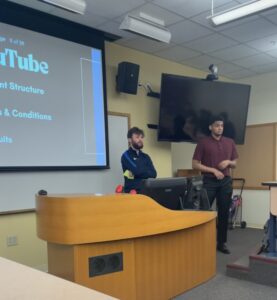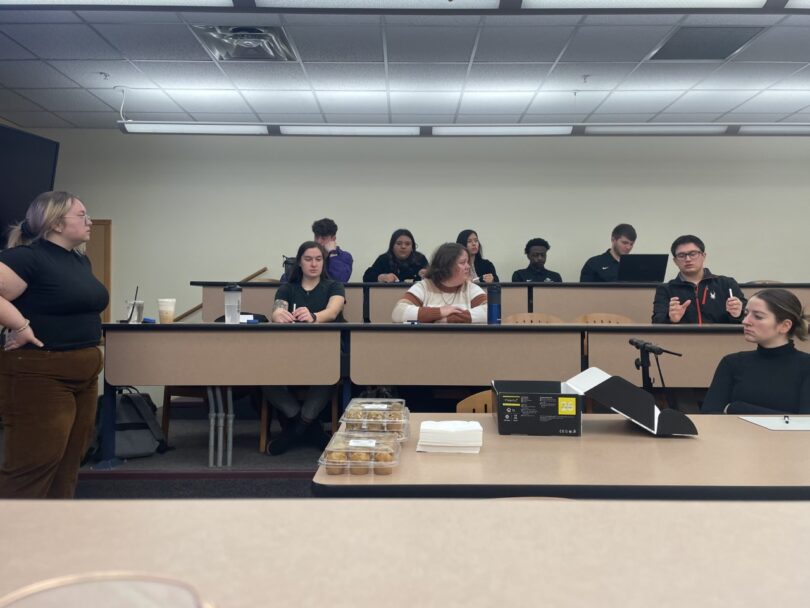By Sarah Rivera Rios
Students in Brienne Sprunger’s Marketing Research class offered a presentation on a series global brands compared to consumers’ perceptions of them for Civic Engagement Day. Presenters said the overall goal of the presentation was to build social awareness of brands and illustrate their impact on society.
Consumer perception is constructed by four stages: exposure, attention, comprehension and retention.
“[A] marketer’s main goal is retention,” said Ella Zaborowski, senior marketing major. “Retention is reflected by holding on to a message, creating brand loyalty and stick around to the brand.”
The class managed to hold the audience’s attention as they implemented a game during the presentation. Students were able to write down their thoughts in one or two words on the brand being displayed on the screen. Once everyone had something written down, the audience lifted their boards and compared it to the people around them.
“We wanted to demonstrate the reality of consumer perception versus the idea the brands are trying to portray,” said Andrea Peralta, senior business administration and marketing major. “Therefore, we decided it was a good idea to gather the actual thoughts on the brands and then give the audience a reality check of what’s currently happening.”
Among the many brands displayed, Shein, McDonalds, Facebook and Twitter presented the widest range in opinions among the students.

Grant Ingham and Trey Clemons presenting at Marketing Research Civic Engagement Day presentation. Photo by Sarah Rivera Rios.
“I only go to McDonalds whenever I want something cheap and quick,” said Josh Slade, senior business administration major. “It isn’t usually something I am craving.”
Although some people agreed with Slade’s opinion, a couple students had something different to say. Yummy, goated and convenient were some of the other words shared by students regarding McDonalds.
“Consumers will loyally purchase from companies who satisfy one, or more, of their needs,” said Sprunger, who is an assistant professor of marketing. “They will also avoid companies they do not believe share their values.”
The audience was impressed by some of the unknown facts shared by the marketing research class.
“I wasn’t aware about the environmental damage Shein has by cloth item they reproduce,” said Paola Lanza, junior nursing major. “One item made by polyester takes from 20 to 200 years to decompose.”
The students not only focused on retailer and wholesaling business, but also in the news industry.
“Using independent sources to evaluate facts and news is extremely important,” said Elizabeth Rockwell, senior business administration, marketing and communication major. “You want to get your news as unbiased as possible because then you are able to form your own opinion based on reliable facts.”
The audience and the students were able to build their own perceptions based on the facts and history shared by the Marketing Research class.
“A consumer’s perception determines if a brand is going to be successful or not,” said Zaborowski. “A lot of companies are based on what to do to make our community better but they turn out to be ultimately harming at the end.”
Editor’s note: This article was produced as part of an assignment for MED 225 Writing for the Media.







